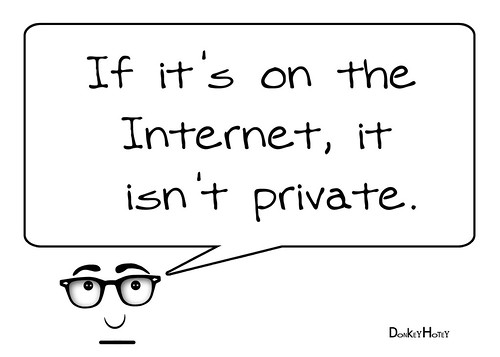Feb
08
2012

We've all heard of privacy issues with Facebook - from college admissions boards and potential employers judging our Facebook profiles to our friends accounts getting hacked and/or spammed. But how many of us actively make sure that our data (and our identities) are secure on the web?
Common Sense
First things first, when including your personal data on social media sites (or any website, for that matter) take a moment to consider whether this is information that you would give to a stranger on the street. If it's not, then don't include it in the online form. Just because there is a field to fill out or because there's a little progress bar of your "profile completion" does not mean that you have to fill it out.
Rule of thumb - for most social media profiles I would not include your full birthday (month, day and year) or your address. And with Facebook, I probably wouldn't include your phone number, either.
What about privacy restrictions, you say? Well...there are always people that can get around them - plus, are you one of those people that accepts friend requests from people you don't know? Yeah, well, one of those people that you don't know could just be "friending" you to get at your "private" information. And, of course, if someone really wants to, they can find ways around your privacy settings.
If you have multiple different accounts where you can "check-in" like Foursquare of Gowalla - check out the site Please Rob Me - it's not completely inclusive in terms of the services that it tracks, as it only goes by your Twitter account - but it's a good indication if you're on the wrong privacy path.
Check The Security
It may seem obvious, but it's something that (obviously) a number of people overlook. When you go to a website that asks for your personal data, like your bank account number or your social security number, make sure that the website is secure - that is, an https://www.blahblah.com site.
Also, before you go to any link in an email from someone you think is an entity that you have an account with, make sure that the link is legitimate. This kind of email spam (posing as a legitimate business and asking for your personal information) is quite widespread. If you want to check where any given link in an email goes just hover over the link and the destination URL should appear without actually activating the link.
Generally, you need to be just as careful with your personal information as you would be in real life. People forget that just because you're filling out a form online and not actually giving someone the information doesn't mean that nobody else can obtain that personal information.
Cecilia Miles works with a company that helps secure information and document sharing in the business world, and hopes that everyone keeps their social and personal data secure on their own time! Having a bunch of Facebook friends isn't worth losing your identity.